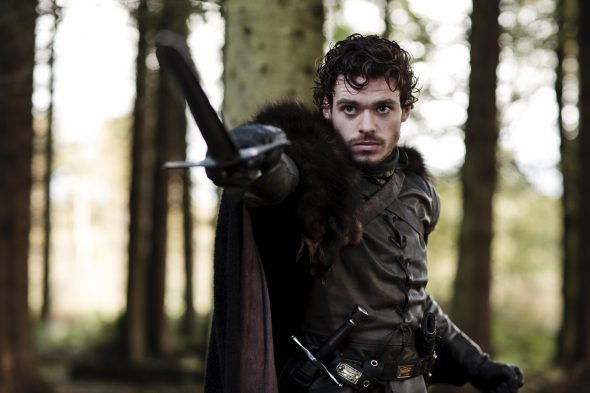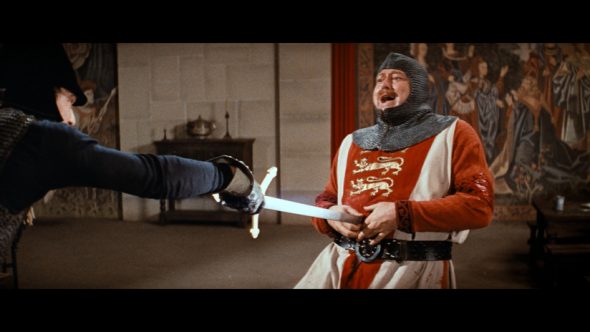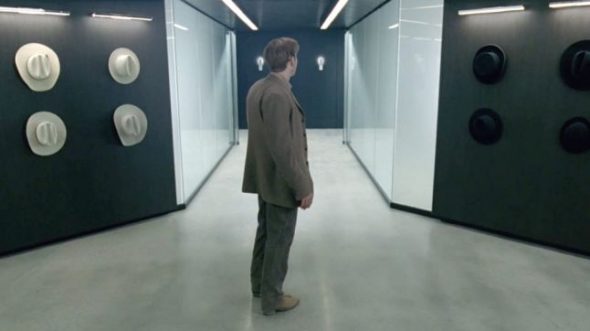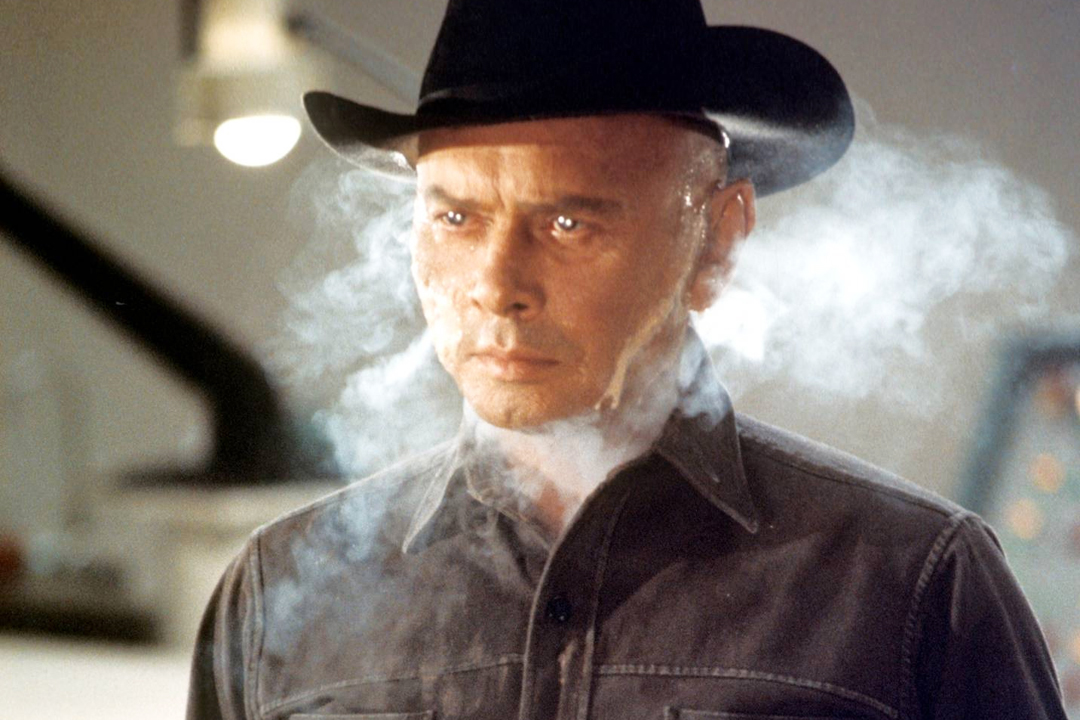Ben Adams: The original movie Westworld came out in 1973, which was a perfect time for it to appear: scifi was coming into its own (hence the robots), but the movie going audience had grown up watching pretty HUGE amounts of Western-themed films. So it was natural to think that if you could create a theme park with robots where people could live out their dreams, that park would be Western themed. But does that still make any sense? Westerns have been out of fashion for quite some time. Are there really that many kids (or even adults) whose wildest dreams are of the Old West?
So my question is this: what would the robot theme park of today really look like? And/or: what does it say that the show is about the Old West anyway?
Matt Wrather: One way to answer is to extend your premise and ask, what did WE grow up watching movies of? And the answer is, of course, Star Wars. And actually, from what I gather, the new Star Wars land at Disneyland will have some Westworld-like elements, including a personalized narrative that follows you from attraction to attraction.
To me it’s a no brainer. If I had to pick my fantasy adventure vacation, I’d much rather be blowing up the Death Star — or getting into blaster battles with storm trooper NPCs whose horrible aim is programmed into them — than listening to covers of Radiohead on a player piano. But the Star Wars universe is largely sexless, and maybe it’s the opportunity for all manner of licentious behavior that recommends the Wild West. It hits all four quadrants of the ‘Merica bracket.
Mark Lee: HBO was probably also banking on the fact that there have been relatively few western TV shows recently. In other words, the new product is well-differentiated from the marketplace. Thematically, though, the opportunities for sex and violence are a good justification for the western setting. The other setting that would provide lots of opportunities for both is medieval fantasy, and, well, HBO’s done that already.
So if we had the technical capabilities to make a theme park populated by robots, I think we’d see a Game of Thrones-type park before we’d see a western park. A Ren Faire with ye newe technology.

Adams: I’m not 100% convinced that a sci-fi setting is necessarily less conducive to sexy-times than a Western or medieval setting would. Correct me if I’m wrong, but the fantasy/knights/RenFaire genre was fairly staid and conservative until relatively recently: Game of Thrones succeeded on some level because the sex was a subversion of traditional tropes.
And while Star Wars is relatively sexless, science fiction as a genre has always been frankly obsessed with sex (see, e.g., the magazine/dust jacket cover of any science fiction magazine from the middle of this century).
Science fiction also has the ability to create park experiences that are more exotic (and as a result, presumably more desirable) to the park’s depraved clientele. Actually having sex with a green-skinned alien is probably a bad idea from a not-getting-infected-with-space-STDs angle. But having sex with a green-skinned sex robot that is programmed to ACT like all the ladies that Capt. Kirk hooked up with is an experience that I suspect would pull in a decent chunk of visitors.
Jordan Stokes: It’s worth noting that the original Westworld isn’t set in the West — not really. There’s an amusement park for adults called Delos that has three themed “worlds:” Roman world, Medieval world, and Westworld. All the robots go nuts, it’s just that the Yul Brynner gunslinger robot turns out to be the most dangerous.
Westworld is just a cooler title than “Medieval-world,” or “Attack of the animatronic Disney hall of presidents,” or “Michael Crichton Presents: Science is the Enemy (part xviii)”
But what Ancient Rome, medieval times, and the old west have in common is pretty much what people have been saying: we think of them as settings where life is cheap and sex is possible. (And yes: science fiction does seem like a conspicuous absence… Which is probably why the sequel, Futureworld, added an additional section of the theme park that’s set on a space station.)

But when we think about the multiple themed worlds, it really does seem more like a satire of Disney. “What if Disneyland, but not family friendly?” A classier scifi writer would have stopped there. Because it’s Michael Crichton (who I love, but still), the thriller component needs to be squeezed in there somehow.
Lee: I like this idea of “cheapness of life” as a key metric for determining which time period to set your sex & violence infused theme park. It also leads me to the uncomfortable realization that there might be a demand for an Antebellum Southland theme park, where racist white people can have their way with slaves without consequences or public condemnation.
Stokes: Eeeeeeeek. And then we’re off to the races, of course. “Conquistador land!” “British Raj land!” “Inquisition land!”
Lee: Which brings us back to the question of “why Westworld is in the old west.” That context (and, for that matter, medieval times and ancient Rome) is protected by a thin veneer of cultural legitimacy, even though the cheapness of life and depravity of practices during those times are on the same level of historical eras that, for various reasons, we haven’t blessed with a certain level of approval.
Medieval times were bad, sure, but armor is shiny and magic is awesome! Romans were cruel, sure, but they built all those roads and aqueducts, and we’ve based much of western civilization on it! The west was won at the expense of Native Americans, but those noble white hats were fulfilling manifest destiny and spreading American civilization from sea to shining sea! The Conquistadors and Inquisitors, though? Eh, they were bad Spaniards who lost their empire and we’re kind of embarrassed by what they did.

Adams: I think you’re on to something there. In the world of the show, that thin veneer of legitimacy would be extremely important from a marketing perspective – even if a guest WANTED to recreate the horrors of chattel slavery or the barbarity of the Conquistadors (and lets face it, there are plenty that would), that wouldn’t make it all of a sudden socially acceptable to GO to SlaveryLand. If the WHOLE PARK is devoted to depravity and moral horror, there’s no plausible deniability.
Your park needs to have both white-hat and black-hat story lines. That way, when you’re talking to your coworkers about your vacation, you can at least CLAIM you saved the damsel in distress and received a chaste kiss in return, when in reality you set the high score for damsels-tied-to-the-same-set-of-train-tracks while you were there.

I feel like in connection to the idea of cultural legitimacy there also a question of myth vs. history. “The West” as we understand it from popular culture is kind of a myth. Think about the idea of a traditional western setting and ask this question: when and where did that place exist? Well pre-civil war the frontier was open, but it also was not America. Post-Civil war there was a rapid expansion built up by the movements of the military and railroads westward. And then by 1896 Fredrick Jackson Turner had declared the frontier closed. I get the feeling that a draw to the idea of a western is the mythology of a never ending frontier-like experience when the historical past does not offer us a clear place or time. I would say the same is true of Rome or Medieval times. When and where would it be situated in the actual historical past is a huge problem without mythologizing it into a historical fiction.
I guess what all this leads me to is that no matter what setting you are establishing, there is a certain amount of mythology that has to be built into it, even if it is based on an actual time or place. So if you wanted to make SlaveryWorld you could, you would just have to build into it a currently non-existent mythology, or if I am being cynical market it as “a day in the life of a slave” to white SJWs so they can say that they better relate to black people because they have experienced slavery too.
The most important aspect of the western myth is what it says about who we are and where we came from. Or, rather, who we think we are. The customers of TV Westworld seem to think that the purpose of visiting Westworld is to find out who you really are, and what better place to think you’re discovering who you are than the place you think you came from?
At first I thought the western theme was actually a safe guard. By setting this fictional world in the 1800s this gives an in-world excuse for the robots limited knowledge.
One of the most dangerous things one of these robots could learn is that they are robots and how to program themselves. If your robot thinks its 1873, they might suspect something is wrong with their world, but could never make the leap to believing they were artificial. Any escape attempts would be limited too since they wouldn’t understand the outside world and would easily be caught. This means any time period before the concept of artificial intelligence became a common idea could work as a theme park.
It might be possible to do a 1920s Gangster World, but much past then and it becomes a liability.
Also, I think Stokes is right about “Westworld” just sounding cooler as title. Jmasoncooper idea that of the collective myth of the wester frontier is also a factor. These robots are the new frontier of life, taming random programing into a version of sentients.
Another aspect particular to the Old West that might be important is the emphasis on individual action. The low population density of the Old West means that events can turn on individual action more readily than in a Sci-Fi or a Ren Faire setting.
I’ve run tabletop Role-Playing Games, and, as compelling as a Death Star Trench Run might be in a story on film, those sorts of moments can be very difficult to create organically when you have autonomous players.
So instead of being sure that you will be the one special in all of the world, you maybe participate in a mass battle and distinguish yourself, but you’re never one of the two people on the dais getting a medal from Princess Leia.
Giving the guest a small pond makes it easier for them to be a big fish, and thus makes a more satisfying experience.
One problem I see with the Antebellum South/Conquistador/Inquisition-Land is that those eras relied heavily on social institutions/mass movements to produce their cruelty. Any individual role would give the guest proximity but not agency (an Inquisitor who takes orders from a bishop) or vice versa (a Bishop who determines who is to be questioned but then merely reads the reports that the Inquisitors produce.)
In any era, you can be an individual Black Hat (there are serial killers in many different historical eras) but only in the Western are the stories archetypally about the individuals.
I feel like you (ScholarSarah) have really hit on something by bringing up this notion of individualism.
There are three notes I want to make, the first comes from a college history course I loved on the history of families in western societies since the early modern period (1500ish to now). A key to understanding the evolution of family dynamics was a growing level of individualism. Families were/are on track to become more nuclear. I say were because that trend kind of peaked in the 50s in America with suburbia and a car in every driveway. Since then families have become more entangled, with the rise in divorce rates, and remarriages (there is a whole conversation to be had about the rhetoric surrounding the ‘disintegration’ of the family, but that is for another time) So I think empowering individualism fits into the historical setting.
The second point I am drawing from my recent reading of “Notes from the Underground.” The narrator of the story makes a case for the idea that the only way to know that we have free will is to do things in contravention to our/others advantage. In other words, being a dick is the only way to know you are free. Now I am not an expert, but this feels right. People who always do what is in there best interest are kind of like robots. Also there is a joy in being an a-hole sometimes.
My final idea has to do with the modern polarization of American culture (collective groan, I know). It feels to me like collectivist activism seems to be a very popular ideology to espouse today. Commonly addressed pejoratively as SJWs, people seem to gravitate towards beliefs that oppression is everywhere and it needs to be uncovered and addressed by any means necessary. Now, in the limited experience I have, this attitude is exhausting. It is tiring to be professionally offended all the time. Hence the beauty of WestWorld as a thing specifically. It is a place that anyone can go to escape the moral demands of collective activism by becoming a selfish individual in a setting (as ScholarSarah said) designed to promote and facilitate individualism. By going there you can live out experiences that help you cement your own conception of your freedom by being able to be as much of a dick or hero as you want, endangering yourself to threaten and fight and defile people (read hosts/robots) or endanger yourself courageously opposing the harm and oppression that others (read hosts/robots) inflict on people. The idea of freeing people by offering choices that could be good or bad, could work to your advantage or against it, seems like a really appealing way to create a fun attraction. Like you all said above, I don’t think the draw is just because of violence/oppression/horror.
In the new series we have no idea how far in the future this is set. The real world outside the park. Season two will probably have a reveal about the outside world. My guess is outside of Westworls is a bland conformity driven world or some kind of wasteland distopia. In either case Westworld would be seen as a representation of American glorified past.
I always thought it was simpler than that: it’s set in the West because of the meta-narrative juxtaposition. Robots contrast with with the setting in a way that’s stark and helps underline everything else going on around them.
Also, while they don’t state it in the show, on the HBO website I believe it states that the “present day” is 2052.
Considering this question of why Westworld is set in the west, my first gut reaction was to ask, “Why is Burning Man in the west?”
Just practically speaking, you need a lot of open land where nobody lives. The western theme also means you don’t have to build much infrastructure.
I’d love a Westworld-type theme park based on modern Manhattan, but in that case the sets would be hugely expensive, and the mayhem would be a lot more destructive of the infrastructure.
I’ve also wondered about the Wild West setting. Obviously it isn’t the real historical west but more like a distillation of John Ford and Sergio Leone movies. After a while the absurdity of the whole enterprise made me question the sanity of the creators. Remember, this is supposed to be a business venture. But what if humanity is extinct? What if the park is operated and maintained by AI and all the guests as well as hosts are artificial? Maybe it started as a small virtual reality wild west theme park with just enough fake guests to spice things up for the ‘real’ human guests. The workers in the background are all robotic too, saving on salaries for real people. The lab techs seem to be awfully shallow nerds, almost stereotypes. Then when a disaster killed all humans the fake hosts and guests kept interacting for tens, hundreds, thousands of years gradually growing and becoming more sophisticated as errors and faulty corrections crept into their program code. Perhaps the AI is in the process of evolving free will to break out of the wild west constraints of their programs. Dolores, William, mauve, and Bernard are all part of that effort to become more than theme park attractions and to forge their destiny. You will note we never see the outside world of millions of men women and children leading ordinary lives except from a distance. Maybe they don’t exist.